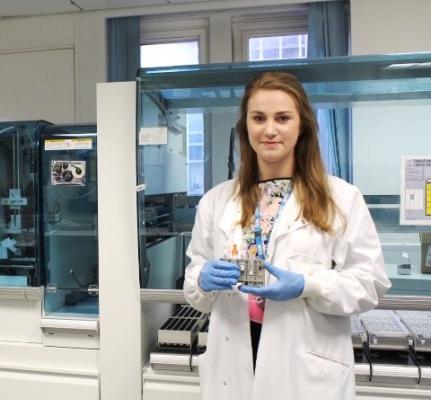Clinical biochemistry
In clinical biochemistry, healthcare science staff analyse blood, urine and other bodily fluids to help diagnose and manage disease.
You’ll validate this analysis to help you advise clinicians on the most appropriate tests, treatment and follow up.
Life in clinical biochemistry
You’ll collaborate with a wide group of healthcare professionals including pathologists, biomedical scientists and GPs.
Traditionally, you’ll be hospital-based in either a clinical biochemistry or chemical pathology laboratory. Increasingly, there are opportunities to work outside of a lab to support patients where they are receiving care, for example clinics and operating theatres.
On a typical day, you’ll:
- plan and organise work in clinical biochemistry laboratories
- conduct complex analysis on specimens of body fluids and tissues
- assure the quality of clinical biochemistry investigations
- audit the diagnostic and clinical use and performance of investigations
- develop new and existing tests, often automated and computer assisted but sometimes requiring considerable manual expertise
- liaise with clinical and other healthcare staff, often as part of a multidisciplinary team
- consult with patients
- write reports
Charlotte Harborow
Trainee clinical scientist
Read Charlotte's storyThe course fitted in all the aspects of my university degree that I loved and more.

How much can I earn?
You’ll be employed on a national pay and conditions system called Agenda for Change (AfC).
There are nine pay bands and below are examples of the pay band you’ll be on, depending on your role within clinical biochemistry.
- Healthcare science assistant – B2/3
- Healthcare science associate – B4
- Healthcare science practitioner – B5
- Clinical scientist – B6/7/8a
- Consultant clinical scientist – B8a-d
How about the benefits?
- make a difference
- flexible and part-time working
- high income early in your career
- work anywhere in the world
- excellent pension scheme
- good holiday entitlement
- NHS discounts in shops and restaurants
Must-have skills
- excellent communication skills to manage a wide range of relationships with colleagues, patients and their families
- emotional resilience, a calm temperament and the ability to work well under pressure
- teamwork and the capacity to lead multidisciplinary teams
- problem-solving and diagnostic skills
- outstanding organisational ability and effective decision-making skills
- first-class time and resource management for the benefit of patients
Entry requirements
There are several different ways to start your career in clinical biochemistry, depending on your experience and qualifications.
- You could look for an entry level job/level 2 apprenticeship – typically GCSEs 9-4/A-C in maths, English and a science.
- If an apprenticeship feels right for you, you’ll need 5 GCSEs at 9-4/A-C (or equivalent) including maths, English and science or Level 2 Diploma in Healthcare Science to start a level 4 apprenticeship.
- An associate practitioner role is another route to a career in biomedical science. You’ll likely require foundation degree, or equivalent experience with training and experience to NVQ level 3
- A level 6 apprenticeship or degree course require relevant level 3 qualifications e.g. 3 A levels (including at least one science subject) or Access to HE course
- To start the Scientist Training Programme, you’ll need a 1st or 2:1 in relevant first degree or relevant higher degree and 2:2 in any subject
- Higher Specialist Scientist Training is available for registered clinical scientists or senior biomedical scientists with relevant MSc or specialist diploma
How to become a clinical scientist in clinical biochemistry
Becoming a clinical biochemist might be easier than you think. You could undertake study at university or find an apprenticeship that takes you straight into a job.
There are assistant or level 2 apprenticeships, associate practitioner roles, level 4 apprenticeships. If you’re already a registered and experienced healthcare scientist, there are degrees, Master’s degrees and Higher Specialist Scientist Training.
See our How to become a healthcare science professional page for the details.
Where a career in clinical biochemistry will take you
Working in clinical biochemistry can lead to registration as a Clinical Scientist. You can then move into senior and consultant Clinical Scientist roles, through the Higher Specialist Scientist Training (HSST) programme.
It can also lead to careers in academia, research, industry, management and leadership and training.
-
Associate Practitioner - Biochemistry
Gateshead, NE9 6SX
- Salary :
- £27485.00 to £30162.00
- Type :
- Permanent
- Employer :
- Gateshead Health NHS Foundation Trust
-
Associate Practitioner - Biochemistry
Gateshead, NE9 6SX
- Salary :
- £27485.00 to £30162.00
- Type :
- Fixed-Term
- Employer :
- Gateshead Health NHS Foundation Trust
-
Pathology Quality Coordinator - Biochemistry
Gateshead, NE9 6SX
- Salary :
- £31049.00 to £37796.00
- Type :
- Fixed-Term
- Employer :
- Gateshead Health NHS Foundation Trust
-
Pathology Support Worker - Biochemistry
Gateshead, NE9 6SX
- Salary :
- £24465.00
- Type :
- Fixed-Term
- Employer :
- Gateshead Health NHS Foundation Trust
-
Support Secretary - Clinical Haematology & Biochemistry
Plymouth, PL6 8DH
- Salary :
- £24465.00
- Type :
- Fixed-Term
- Employer :
- University Hospitals Plymouth NHS Trust
-
Biomedical Scientist, Biochemistry - Ross Hall Hospital
Glasgow, G52 3NQ
- Salary :
- £27000.00 to £32000.00
- Type :
- Permanent
- Employer :
- The Doctors Laboratory
-
Clinical Biochemistry Quality Team Leader, Band 7
Gloucester, GL1 3NN
- Salary :
- £47810.00 to £54710.00
- Type :
- Permanent
- Employer :
- Gloucestershire Hospitals NHS Foundation Trust
-
Trainee/BMS/Specialist BMS (Biochemistry/Haematology/Transfusion)
Carlisle, CA2 7HY
- Salary :
- £31049.00 to £46580.00
- Type :
- Permanent
- Employer :
- North Cumbria Integrated Care NHS Foundation Trust
Showing 6 of 8 results




